June 2, 2025 | 05:38 GMT +7
June 2, 2025 | 05:38 GMT +7
Hotline: 0913.378.918
June 2, 2025 | 05:38 GMT +7
Hotline: 0913.378.918
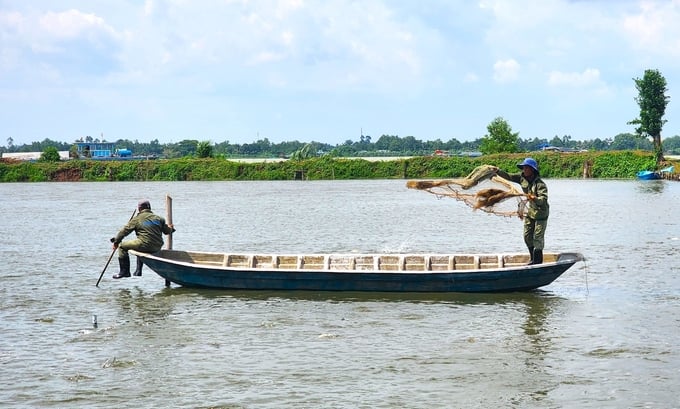
Since the beginning of the year, diseases on pangasius have decreased in both scope and area. Photo: Kim Anh.
The Department of Fisheries (Ministry of Agriculture and Rural Development) has conducted regular environmental monitoring, warning and surveillance at 140 pangasius farming areas this year. The unit thus comes to the conclusion that the quality of the water source for pangasius farming is polluted. This affects the growth and development of farmed aquatic products and poses a potential risk of disease.
Statistics from the Department of Animal Health show that in the first 9 months of 2024, the area of pangasius farming affected by disease totaled 260 ha. The disease occurred in 60 communes and 20 districts in three provinces of An Giang, Dong Thap and Vinh Long, on both fingerlings and commercial pangasius.
The fish mainly suffer from bacillary necrosis of pangasius (over 119 ha) and hemorrhagic disease (over 127 ha). Over 43 ha of farms were infected with other diseases such as yellow fillet syndrome, white gill and liver, white tail, and swollen head.
The disease in pangasius seems to have decreased in both scope and area compared to the same period in 2023. One problem is that the fish are raised in open ponds, so water is continuously added and changed without treatment. The floating rafts use natural river water, hence difficulties in controlling waterborne pathogens. The stocking density of farmers or farming facilities is often very high, so the risk of disease outbreaks is always present.
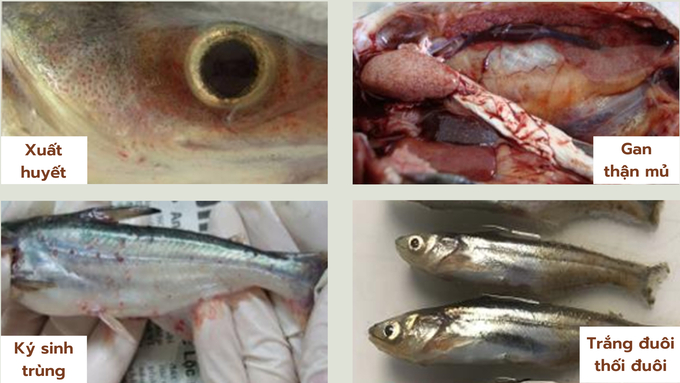
Some common diseases seen on pangasius in the Mekong Delta (hemorrhagic disease, bacillary necrosis, parasite disease, tail rot disease). Photo: Kim Anh.
The Department of Animal Health has recently conducted monitoring of 105 samples (including 69 pangasius samples, and 36 samples of mud and water) in An Giang, Dong Thap and Vinh Long provinces. The results showed that three samples were positive for hemorrhagic disease, and 100% of samples were negative for bacillary necrosis. The veterinary agency has conducted antibiotic susceptibility testing to guide localities and treatment facilities in positive ponds.
The Department of Animal Health recommends localities strengthen monitoring and early detection of diseased and dead pangasius for timely handling in the near future. In cases where fish die in large numbers, abnormally at a high rate, samples should be taken and sent for testing to determine the cause.
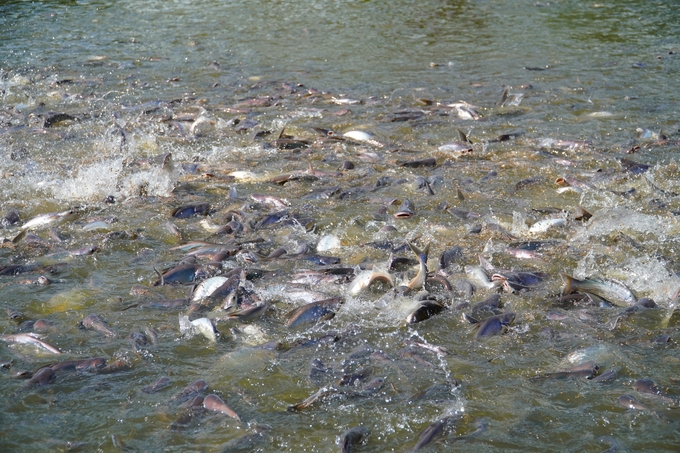
There are currently 1,690 facilities nationwide that produce and breed pangasius. Facilities need to develop plans and proactively monitor diseases. Photo: Kim Anh.
As for pangasius farming households, the professional agency recommends that people strictly follow the farming procedure in terms of stocking density, wastewater and waste treatment, and improve nutrition to strengthen the fish’s resistance to disease. Farmers are encouraged to use vaccines to prevent diseases to limit antibiotic abuse.
Over the past 10 years from 2014 to 2023, the Ministry of Agriculture and Rural Development has implemented 29 scientific and technological tasks, researching pathogens, detection methods, disease prevention and treatment solutions, vaccines, biological products for disease prevention, and improving the resistance of farmed aquatic products.
Some particular studies have proposed and applied effective disease prevention measures. The examples include the process of creating recombinant vaccines to prevent diseases in pangasius, attenuated vaccines to prevent bacillary necrosis of pangasius, and solutions to prevent and treat tail rot disease in pangasius.
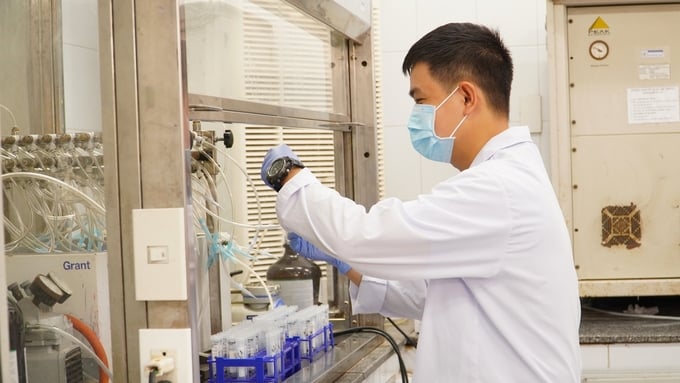
Scientific research and technology applications will contribute to creating fast and accurate diagnostic methods for farmed aquatic products. Photo: Kim Anh.
The Department of Animal Health has licensed six vaccine products for businesses to date. Two among them are for preventing diseases in pangasius. Many research units have also been conducting projects to develop vaccines to prevent diseases in pangasius.
These studies will contribute to the creation of methods for rapid and accurate diagnosis of diseases in pangasius. At the same time, it will minimize the spread of dangerous diseases and reduce dependence on the use of antibiotics. Aquatic products will experience an improvement in terms of quality and higher competitiveness in domestic and international markets.
The Department of Fisheries has issued 1,109/1,286 certificates of aquaculture registration for pangasius, reaching 87%, the highest among farmed aquatic products. In the first 9 months of 2024, Vietnam's pangasius output reached 1.3 million tons, up 3% over the same period last year, with an export value of USD 1.3 billion.
Translated by Samuel Pham
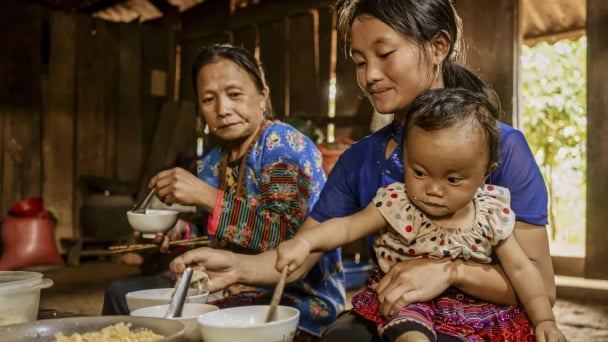
(VAN) 30 experts in health, agriculture and environment participated in a consultation workshop to inform the development of a methodological framework aimed at supporting Vietnam’s transition to a sustainable food system.
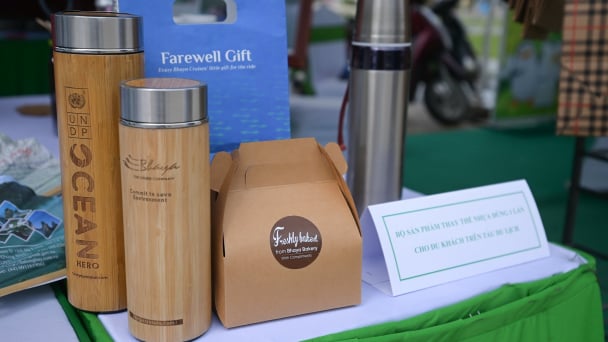
(VAN) Over the past five years, Quang Ninh Province has vigorously and synchronously implemented the ‘Say No to Plastic Waste’ campaign, yielding positive outcomes in advancing sustainable tourism.

(VAN) The prevention of plastic pollution necessitates collaboration among governments, businesses, and citizens. Today's little things contribute to a future free of plastic.

(VAN) This was the directive given by Deputy Minister Phung Duc Tien during a meeting with the Department of Livestock Production and Animal Health, and relevant stakeholders to prevent and control African swine fever.
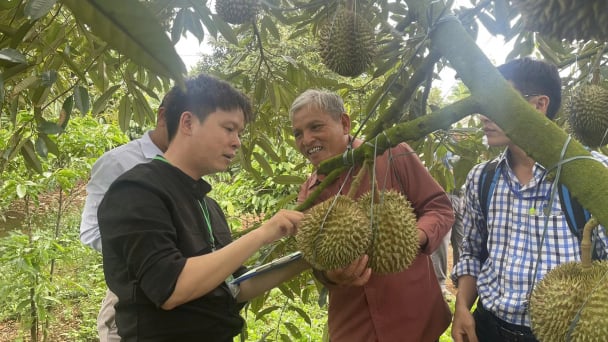
(VAN) For the durian industry to succeed, the value chain must fulfill its commitments to the government, the community, and international partners.

(VAN) Vaccinating juvenile pangasius helps reduce disease, antibiotic use, and farming costs, increasing profits for export-oriented farmers in An Giang.

(VAN) Due to a limited supply of workforce and competitive recruitment requirements, businesses struggle to retain talented veterinary human resources.